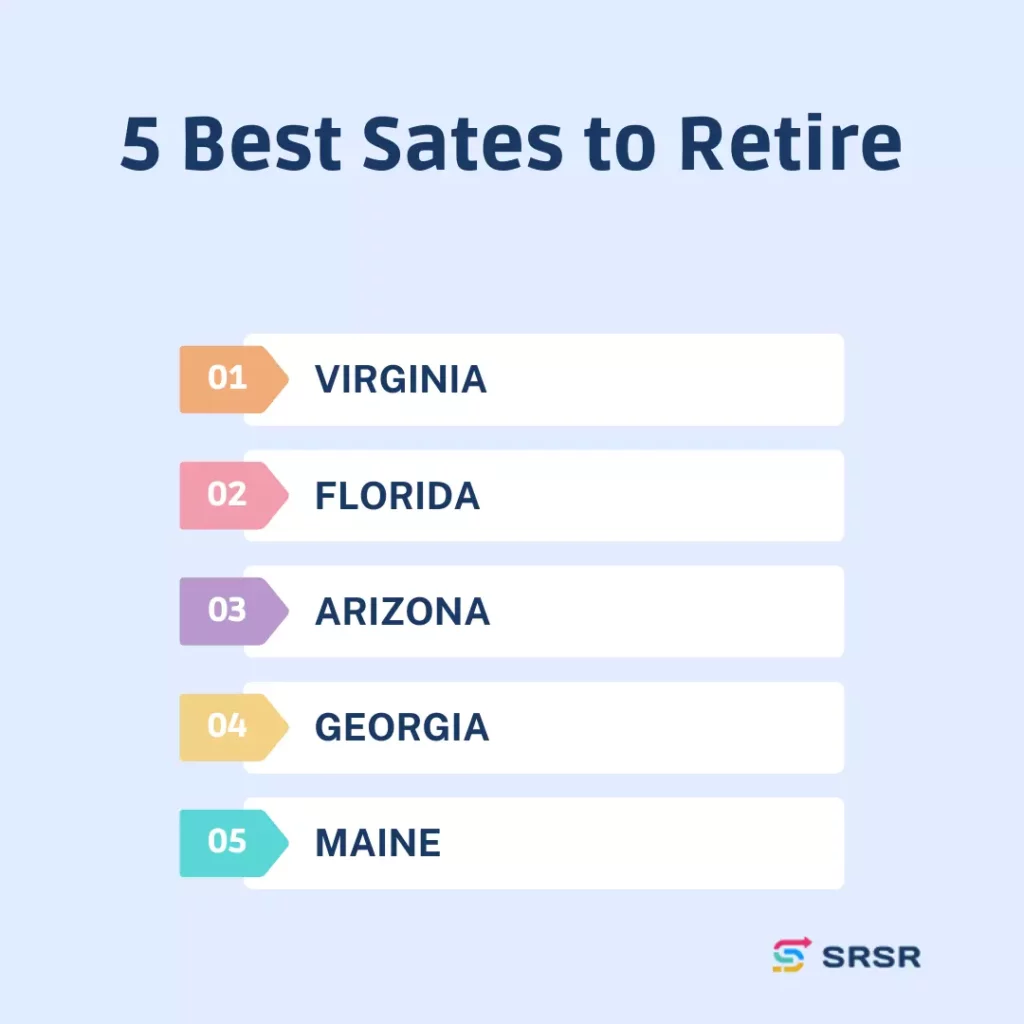Everyone has an opinion about the best places to live. You can also expect to encounter some firmly held convictions when considering the best state to retire to as well. This article helps you brainstorm the right state for your retirement relocation when the time comes.
Why is choosing a state to retire in important?
Choosing the best state to retire in can significantly impact your quality of life during retirement. Retirement is meant to be a time of relaxation and enjoyment. Where you choose to live as a retiree can greatly affect your ability to make the most of your golden years.
Retiring can challenge some individuals. They might struggle to slow down after decades of hard work. Or find they feel more anxious now that they have more time on their hands, but perhaps less money to spend. Finding things to do can also feel like a big hurdle for the newly retired. All this can prompt some people to make a move to a new place, where they can start fresh.
Some people also relocate when they retire to be closer to family. Others move for health or financial reasons. Choosing the right state to retire in can also ensure your access to amenities, services, and activities.
Ultimately, there are many factors to consider. We’ll address those in more detail next.
How to pick the best state for you?

There are many factors to consider when selecting the best state to retire to. You’ll want to weigh the following in line with your needs and preferences to help ensure you have a fulfilling and comfortable retirement.
Your retirement experience can be impacted by the following:
- Cost of living: This varies greatly across the nation. Living in a state with a lower cost of living can help you stretch your retirement income further. Read on to learn about creating a retirement income strategy.
- Taxation: Look for a state with a lower income tax rate or no income tax for those over 65. States with higher taxes can be more challenging for retirees on a fixed income.
- Access to healthcare: Being able to seek care from a better healthcare system is crucial during retirement.
- Climate: Those who prefer a warm climate may want to live in the south. Yet, others might find southern temperatures too hot and prefer enjoying four distinct seasons.
- Proximity to family and friends: The ability to visit with loved ones and enjoy activities with friends can positively impact your mental health in retirement.
- Lifestyle: Consider the types of activities that you enjoy when you consider the different states. If you want to be able to hike and bike, your choice might be different than someone who wants to take walks on a beach or bird watch.
- Cultural offerings: Now that you have the time to see and do more things, you may prioritize a state with an abundance of cultural offerings from which to choose.
- Crime rates: Many rankings of best states to retire to also weigh crime and safety.
Keep in mind, as well, that places you’ve enjoyed as a tourist may not be the best option for a retirement destination. There’s a difference between escaping to a location for a week or two and relocating to that place long-term.
Comparing taxation in each state
For the first time in the nation’s history, by 2035, the United States will have more adults aged 65 years or older than children under the age of 18, according to the Census Bureau. Many states tax those over the age of 65 differently to attract the older population to take up residence.
| State | State Income Tax Rate | Average Property Taxes | Taxation of Social Security | Taxation of Pensions | Military retirement pay taxation |
| Alabama | 2-5% | 0.39% | No. | Private pensions and recognized retirement plans are exempt. | None |
| Alaska | No income tax | Some cities levy a property tax of 1.17%. | No. | Yes. | Yes. |
| Arizona | 2.55%-2.98%. | 0.51%; Total tax rate capped on owner-occupied homes. | No. | Yes. | None |
| Arkansas | 2.0%-5.5%. | 0.57% | No. | Yes. | Yes. |
| California | 1%-12.3%. | 0.71% | No. | Yes. | Yes. |
| Colorado | 4.4%. | 0.48% | No. | Yes. | Yes. |
| Connecticut | 3%-6.99%. | 1.96% | Yes. | Yes. | None |
| Delaware | 0%-6.6%. | 0.53% | No. | Yes. | Yes. |
| Florida | No income tax | 0.80% | No. | Yes. | Yes. |
| Georgia | 1%-5.75% | 0.81% | No. | Yes. | Yes. |
| Hawaii | 1.4%-11% | 0.27% | No. | Excludes from state taxes. | None |
| Idaho | 1.125%-6.5% | 0.49% | No. | ||
| Illinois | 4.95% | 2.07% | No. | Excludes from state taxes. | None |
| Indiana | 3.23% | 0.75% | No. | Yes. | Yes. |
| Iowa | 0.33%-8.53% | 1.5% | No. | Yes. | None |
| Kansas | 3.1%-5.7% | 1.33% | Yes. | Yes. | None |
| Kentucky | 5% | 0.8% | No, | Yes. | Yes. |
| Louisiana | 1.85%-4.25% | 0.55% | No. | Yes. | None |
| Maine | 5.8%-7.15% | 1.09% | No. | Yes. | None |
| Maryland | 2%-5.75% | 0.99% | No. | Yes. | Yes. |
| Massachusetts | 5% | 1.12% | No. | Yes. | None |
| Michigan | 4.25% | 1.32% | No. | Yes. | None |
| Minnesota | 5.35%-9.85% | 1.02% | Yes. | Yes. | None |
| Mississippi | 0-5% | 0.75% | No. | Excludes from state taxes. | None |
| Missouri | 1.5%-5.3% | 0.88% | Yes. | Yes. | None |
| Montana | 1%-6.75% | 0.74% | Yes. | Yes. | Yes. |
| Nebraska | 2.46%-6.84% | 1.51% | Yes. | Yes. | Yes. |
| Nevada | No income tax | 0.48% | No. | Yes. | Yes. |
| New Hampshire | 5% | 1.77% | No. | Yes. | Yes. |
| New Jersey | 1.4%-10.75% | 2.26% | No. | Yes. | None |
| New Mexico | 1.7%-5.9% | 0.73% | Yes. | Yes. | Yes. |
| New York | 4%-10.9% | 1.62% | No. | Yes. | None |
| North Carolina | 4.99% | 0.70% | No. | Yes. | Yes. |
| North Dakota | 1.1%-2.9% | 0.94% | No. | Yes. | None |
| Ohio | 0-3.99% | 1.41% | No. | Yes. | None |
| Oklahoma | 0.25%-4.75% | 0.85% | No. | Yes. | Yes. |
| Oregon | 4.75%-9.9% | 0.82% | No. | Yes. | Yes. |
| Pennsylvania | 3.07% | 1.36% | No. | Excludes from state taxes. | None |
| Rhode Island | 3.75%-5.99% | 1.3% | Yes. | Yes. | Yes. |
| South Carolina | 0-7% | 0.52% | No. | Yes. | Yes. |
| South Dakota | No income tax | 1.08% | No. | Yes. | Yes. |
| Tennessee | No income tax | 0.56% | No. | Yes. | Yes. |
| Texas | No income tax | 1.6% | No. | Yes. | Yes. |
| Utah | 4.85% | 0.52% | Yes. | Yes. | Yes. |
| Vermont | 3.35%-8.75% | 1.73% | Yes. | Yes. | Yes. |
| Virginia | 2%-5.75% | 0.75% | No. | Yes. | Yes. |
| Washington | No income tax | 0.84% | No. | Yes. | None |
| West Virginia | 3%-6.5% | 0.55% | No. | Yes. | Yes. |
| Wisconsin | 3.54%-7.65% | 1.51% | No. | Yes. | None |
| Wyoming | No income tax | 0.55% | No. | Yes. | Yes. |
5 states that consistently top the rankings
You can find the rankings of best states to retire to online. Looking at them, including rankings by Travel + Leisure, AARP, and U.S. News and World Report, we’ve summarized the pros and cons for the five states that consistently top the lists. Note: these five are not ranked.

Virginia
Offering good quality of life and access to top healthcare systems, Virginia is often cited as a great place to retire. The state has no income tax on social security benefits and deductions for retirement income. Plus, there’s natural beauty to enjoy as well as many cultural opportunities. You can move near the coast or hike the Shenandoah National Park or join the famed Appalachian Trail. On the roads, though, you may encounter bad traffic congestion.
Florida
No state income tax and reasonable property taxes make Florida appealing on the affordability front. Plus, you’ll have access to golf courses, shopping, cultural activities, and the advantage of family and friends wanting to visit the Sunshine State’s tourist attractions. The climate is a plus for some, but the heat of summer is a con for others.
Arizona
The low cost of living and tax rates are two factors that see Arizona making the rankings. It’s also a good choice for retirement because of its warm weather and regular sunshine. You can expect to find other retirees new to the state as well. You can unite in your distaste for the air quality.
Georgia
The weather is one of the big reasons people retire to Georgia. You can enjoy warm winters as well as proximity to the beaches. “The Peach State” has booming Atlanta and historic Savannah as well. Plus, Georgia doesn’t tax social security benefits, and taxpayers over 65 can exclude up to $65,000 of their retirement income from state taxes. Some drawbacks, though, are that the state lacks older residents, and you may encounter higher property crime.
Maine
With a high percentage of residents over the age of 65, you can count on Maine to have people like you. You’ll have to endure cold winters, but if you enjoy the natural beauty and getting outdoors Maine may appeal. The state also gets high health rankings for both quality and affordability of care, and its safety often pulls it up the listings too.
Next steps
You’ll find many good reasons to choose one state to retire over another. This article rounds up some of the main things you might consider. Your personal preferences will ultimately make your decision simpler.
Want to learn more about retirement planning? Find out more about navigating retirement taxes in our in-depth article.
